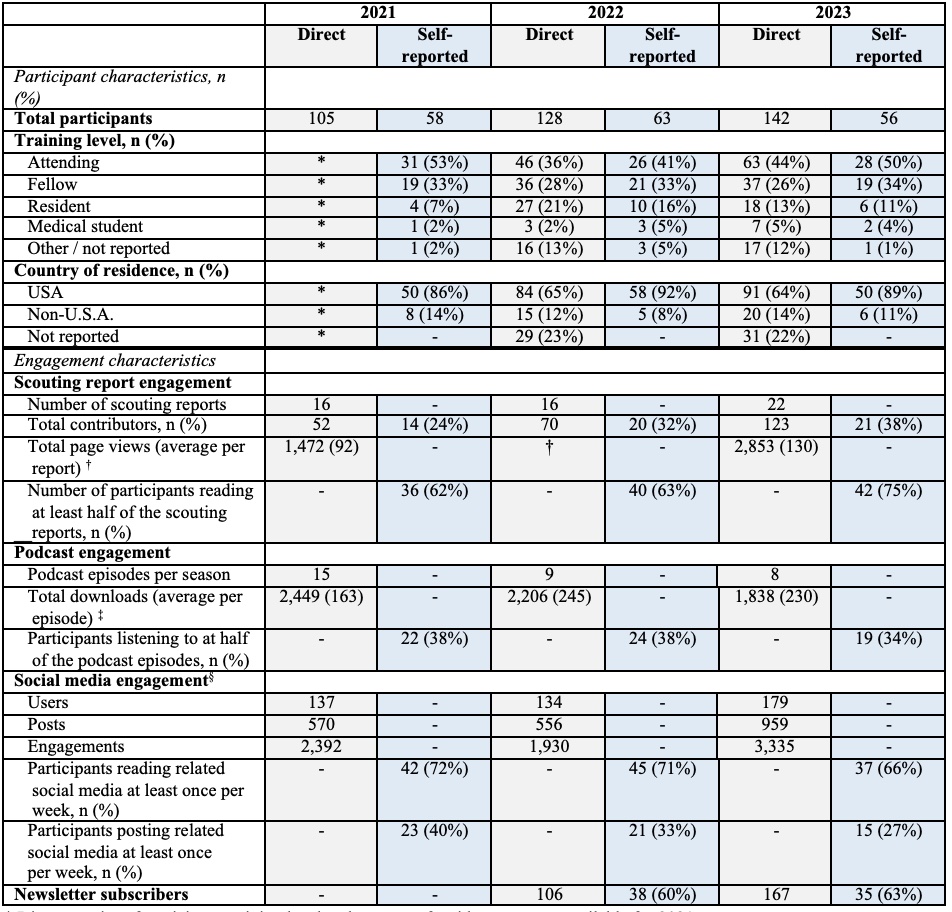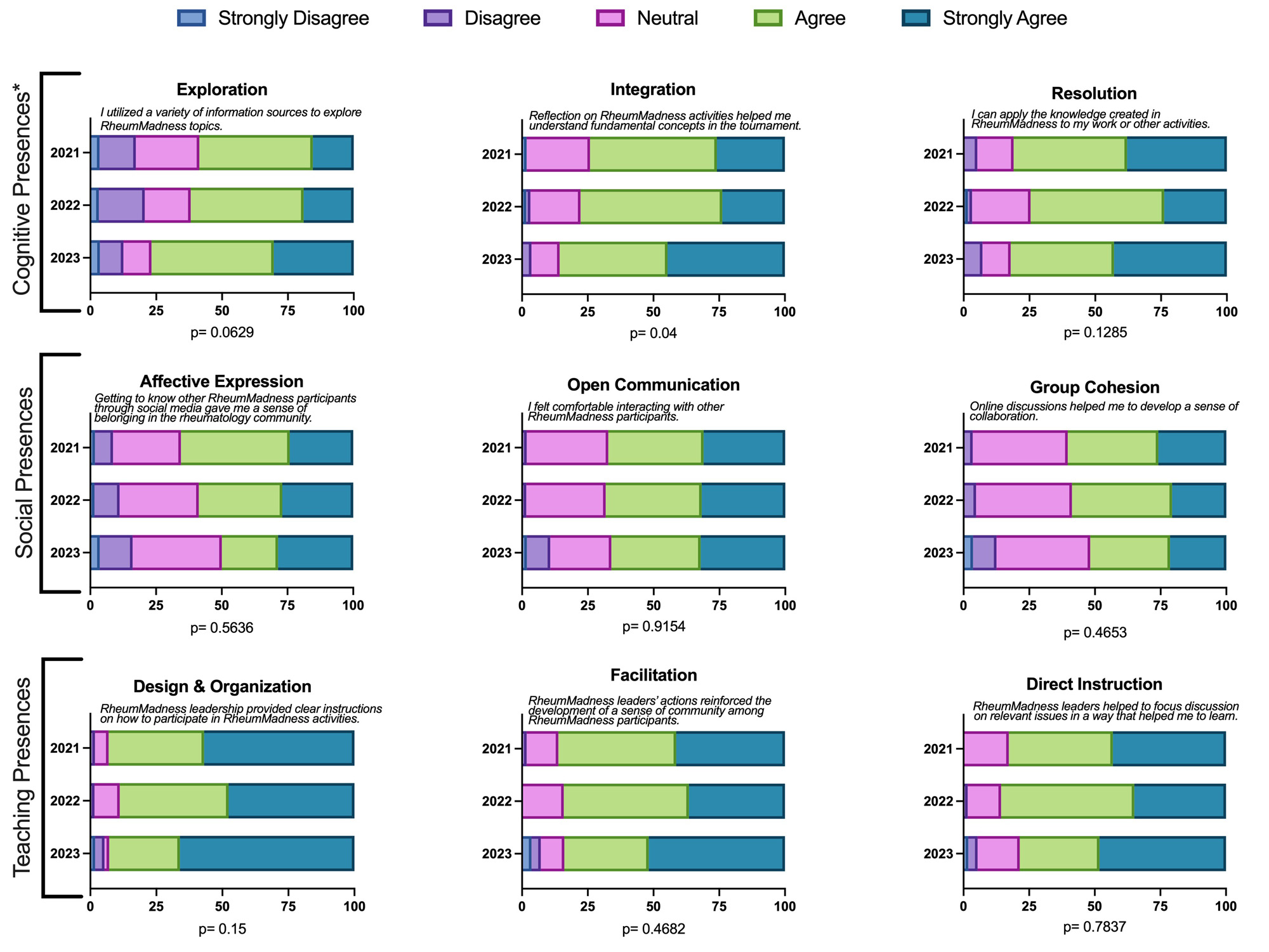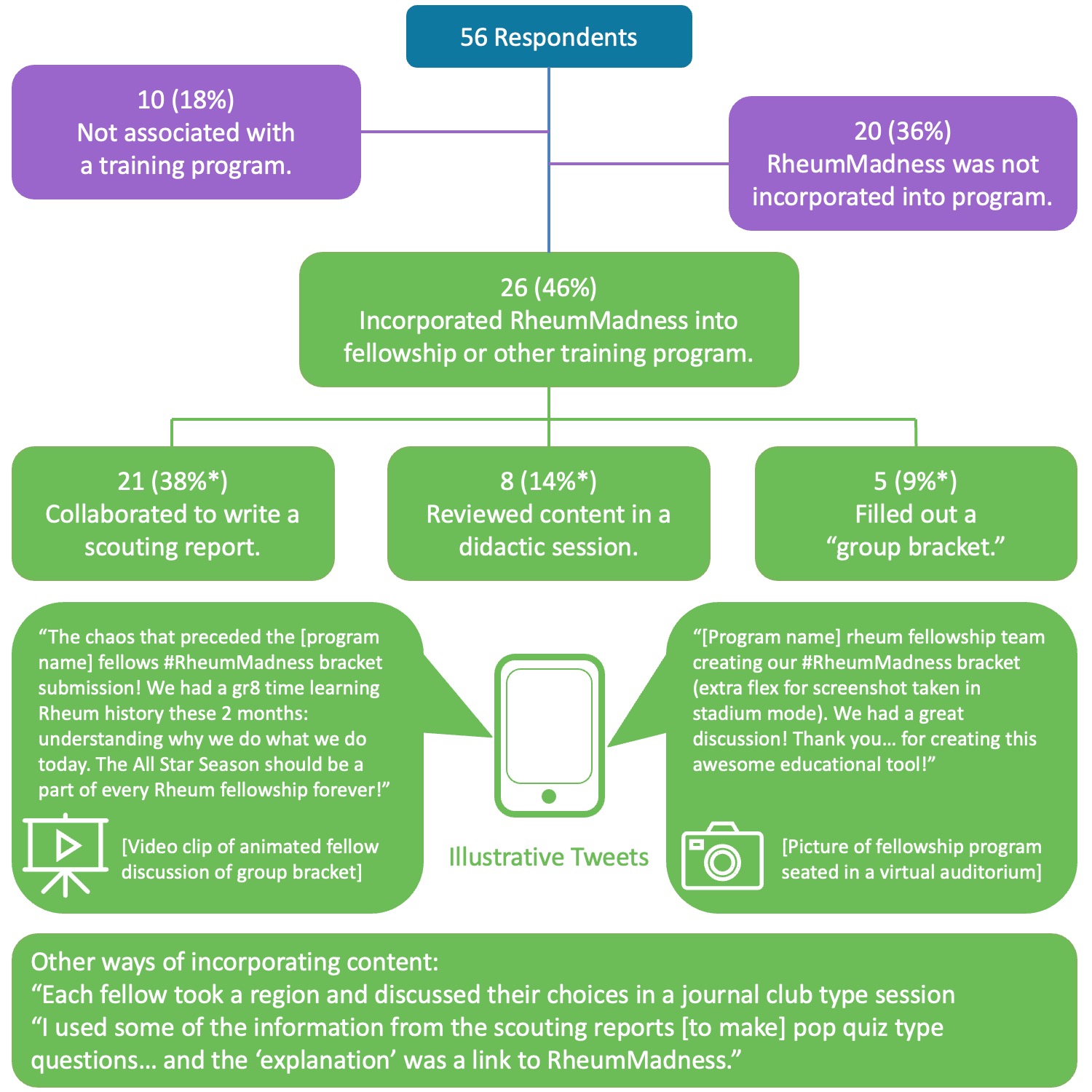Session Information
Session Type: Abstract Session
Session Time: 2:00PM-3:30PM
Background/Purpose: To evaluate the evolving impact of RheumMadness, an online educational tournament of competing rheumatology concepts, over three years by describing changes in participant engagement, learner experience via the Community of Inquiry (CoI) framework, and incorporation of RheumMadness into local programs.
Methods: RheumMadness 2021, 2022, and 2023 presented single-elimination brackets of 16, 16, and 22 concepts, respectively, represented by scouting reports written by volunteer groups. During the 2021 and 2022 seasons the RheumMadness leadership team selected the concepts, whereas in 2023, authors selected the concepts. Participants submitted brackets predicting matchup outcomes, listened to the RheumMadness podcast, and discussed concepts on social media. Web-based analytics tracked engagement. A Qualtrics survey was distributed each year to assess self-reported engagement and CoI presences. The 2023 survey asked additional questions about incorporation of RheumMadness content into local programs. Prism v.9.3.1 was used to analyze normalized and non-normalized data with one-way ANOVA and the Kruskal-Wallis test by ranks, respectively.
Results: Participation increased annually from 105 bracket submissions in 2021 to 142 in 2023 (Table 1). Similarly, the number of authors contributing to a scouting report grew from 52 in 2021 to 123 in 2023. Scouting report views grew from 92 per report in 2021 to 130 per report in 2023, and over 60% of participants reported reading at least half of the scouting reports all three years. Despite an increase in direct metrics of social media engagement (users, posts, and engagements) from 2021 to 2023, there was a non-significant decrease in self-reported reading (p= 0.7531) or posting (p= 0.2560) related content on social media. Across all three years, over half of respondents agreed or strongly agreed with CoI prompts related to each cognitive, social, and teaching subdomain (Figure 1). Within the cognitive presence, there was a significant increase in knowledge integration in 2023 versus prior years (p= 0.04). Other subdomains did not change significantly over time. In 2023, 26/56 (46%) of respondents reported that their local training program incorporated RheumMadness content in some way, primarily by creating a scouting report. Some programs also reviewed RheumMadness content in a didactic session, hosted a journal club, or created quizzes (Figure 2). Further curricular integration at the undergraduate and graduate medical education may be warranted, as RheumMadness increased interest in rheumatology for 23/26 (88%) medical student and resident respondents.
Conclusion: Growth in engagement metrics and stable positive self-reported CoI experience suggests that RheumMadness continues to foster an online rheumatology community of learning. Enhanced knowledge integration in 2023 suggests effective improvement efforts, such as team selection by scouting report authors. Incorporation of RheumMadness content into rheumatology training programs and positive impact on early trainees indicates utility as an educational and recruitment tool, with opportunity for expansion as a novel curricular element for graduate and continuing medical education alike.
* Direct metrics of participant training level and country of residence are not available for 2021.
† Data from Google Analytics from the time the reports were posted until tournament completion each year of the tournament. Scouting report views are not available in 2022 as the reports were hosted on an external website.
‡ Data from Buzzsprout.com hosting service from July through April each season.
§ Data from Keyhole.co, measuring engagement (primarily on Twitter) with the hashtag #RheumMadness from January through April of each tournament year.
*The triggering presence (I can apply the knowledge created in RheumMadness to my work or other activities) was omitted from representation of cognitive presences due to space; participants demonstrated stable (p= 0.7075) agreement.
*Percent reflects the proportion of all respondents (n= 56) selecting a response.
To cite this abstract in AMA style:
Balbach M, Usmani S, Katz G, He L, Macklin M, Qaiser I, Kellogg J, Bair C, Lueck B, Garren A, Sparks M, Criscione-Schreiber L, Leverenz D. An Atypical ClassRheum: RheumMadness, a Collaborative Rheumatology Competition Building Knowledge and Community [abstract]. Arthritis Rheumatol. 2023; 75 (suppl 9). https://acrabstracts.org/abstract/an-atypical-classrheum-rheummadness-a-collaborative-rheumatology-competition-building-knowledge-and-community/. Accessed .« Back to ACR Convergence 2023
ACR Meeting Abstracts - https://acrabstracts.org/abstract/an-atypical-classrheum-rheummadness-a-collaborative-rheumatology-competition-building-knowledge-and-community/



